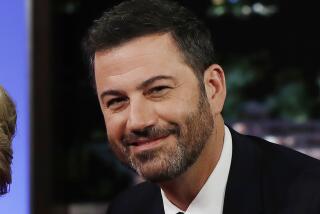Time to Celebrate Kelly’s ‘Hero’
- Share via
ORCHARD PARK, N.Y. — Hunter Kelly will get a birthday kiss from mom and dad in a room filled with balloons.
But the celebration will last only so long. The challenging business of day-to-day living must be confronted: doses of medicine and vitamins, lung treatments and physical therapy.
Hunter, the son of Hall of Fame quarterback Jim Kelly and wife Jill, turns 7 Saturday -- a milestone for a boy doctors said would die from Krabbe disease by the time he was 14 months.
“It’s another celebration for another year that my son has beaten the odds, pulled through,” Jim Kelly said. “I don’t know how he does it. He’s without a doubt my hero.”
The Valentine’s Day baby who shares a birthday with his father has provided hope for families whose children are seriously ill.
“He’ll never be able to do what daddy did,” said Kelly, who led the Buffalo Bills to an unprecedented four straight AFC titles in the early 1990s.
“But he’s going to do greater things. He’s going to make a difference in kids’ lives. He already has.”
The Kellys established Hunter’s Hope, a foundation that has raised nearly $6 million to promote treatment, education and research into Krabbe. An agreement is near on building a lab dedicated to Krabbe and related diseases.
Krabbe affects one in 5 million newborns. The inherited degenerative disorder hinders development of the fatty sheath that protects the brain’s nerve fibers.
First diagnosed almost 100 years ago, the disease has no cure. It induces seizures, stiffens limbs and slows motor and mental development. Most born with Krabbe don’t live past their second birthday.
The disease also can develop in juveniles and adults.
Records are scarce but experts say Hunter is one of the longest to live among those who developed Krabbe as infants.
He’s made it this far, for the most part, because of the round-the-clock care and constant nurturing his family is able to provide.
Jill, her mother Jacque Waggoner and a nurse divide time monitoring Hunter overnight. The Kellys also provide their son with physical therapists and a teacher.
Hunter can move his arms, lift his head and communicate through facial expressions: One blink means yes, a squint means he’s concentrating, raised eyebrows mean he’s happy.
He can understand stories read to him. He recently showed a capacity for bowling, able to hold a ball and aim it toward the toy pins at home.
“These were all things we were told would never happen. Just forget it,” Jill Kelly said. “They said, ‘He’s going to go into a coma. He’s going to go blind. He’s going to go deaf. He’s not going to understand anything.’
“Every day for Hunter is amazing to us because it’s far beyond anything we could’ve ever imagined or hope for,” she said.
Hunter can’t breathe on his own and is fed through a tube connected to his small intestine. He battles bouts of pneumonia that require hospital visits, raising the specter that the next trip will be his last.
“It’s a scary time every time we go there. It’s horrible,” Jill said. “But he continues to show us that God’s in control beyond anything we can understand.”
More to Read
Sign up for Essential California
The most important California stories and recommendations in your inbox every morning.
You may occasionally receive promotional content from the Los Angeles Times.












